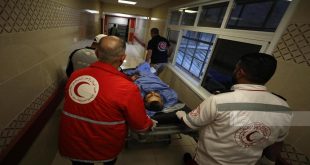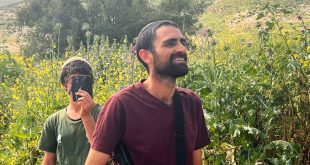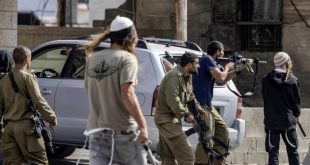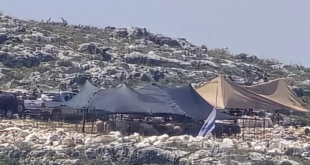The Palestinian village of Burin is located east of the city of Nablus in the West Bank. In 1983, the settlement of Yitzhar was built on village land to the east of the village itself. Route 60, the West Bank’s main traffic artery, lies between the village and the settlement. Burin residents have suffered many violent attacks at the hands of the settlers ever since Yitzhar was established. The Burin Boys and Girls High School has also been subjected to attacks. The school is located a kilometer away from Route 60 and a military post was erected right beside it.
On 16 March 2017, at around 11:00 A.M., two settlers arrived at the school. According to eyewitness accounts, one of them climbed onto the fence, while the other stayed behind it. When the students came outside during recess, the settler who was on the fence started taking photos of them. He also threw stones, shouted and made obscene gestures at them. The students, who congregated in the school yard, responded to this provocation by throwing stones at the settler. At that point, he climbed down, and he and the other settler retreated about 700 meters away from the school. A few minutes later, another settler arrived. This settler was armed and is apparently a security guard at the adjacent settlement of Yitzhar. The settler who been standing behind the fence began throwing stones in the direction of the school. A few seconds later, the armed settler fired one shot in the air. It was at that point that three soldiers arrived on the scene. They stood beside the settlers without arresting any of them, or at the very least, removing them from the area.
Instead, a DCO (District Coordination Office) representative called the school principal. Further to the telephone call, the vice-principal went out to speak to the soldiers. The soldiers showed the vice-principal photos taken earlier by the settler who had climbed on the fence, and said that the students had thrown stones at people traveling on Route 60 earlier. About half an hour after the incident began, school staff dismissed the students to avoid an escalation.
The video footage, and the testimonies collected by B’Tselem’s field researcher indicate that the settlers came up to the school, threw stones and fired in the air unhindered despite the proximity to the military post. Not only did the soldiers who arrived at the scene not arrest or remove the settlers, when they spoke with the vice-principal they contended that the students had thrown stones.
The soldiers’ conduct in this incident is yet another illustration of how the military, with consistent backing from high-ranking officials, functions in the West Bank almost exclusively in the service of the settler population. Notwithstanding that it is their duty to do so, not only did the soldiers fail to lift a finger to protect Palestinians, they even served as a mouthpiece for the settlers’ allegations. This incident also gives further insight into the double standard Israeli security forces apply to stone-throwing: If a Palestinian throws stones, it is clearly a case of immediate danger and the threat must be neutralized, including by use of lethal force. Whereas if the assailant is a settler, and even if he fires a gun, the assumption is that there must some justification for his actions and the military can just stand by and watch the scene unfold from the sidelines.

 العربية
العربية עברית
עברית Türkiye
Türkiye Русский
Русский Français
Français We Watch Israeli Violations Specialized website in monitoring and documenting Israeli violations against Palestinians
We Watch Israeli Violations Specialized website in monitoring and documenting Israeli violations against Palestinians






